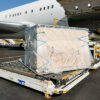Do the Northern Lights Affect Airplanes and Cargo Ships?
One of the most breathtaking wonders of the world is the aurora borealis. Also known as the northern lights, witnessing this phenomenon is on everyone’s bucket list. When the sun experiences a solar flare (a flash of increased brightness), charged particles can shoot down to the earth’s atmosphere and collide with our magnetic shield. The collisions in our sky create a wide variety of colors in the “Auroral Zone.” Alaska and Canada are in this zone, meaning residents get to witness the aurora borealis on a semi-frequent basis.
Lucky for us, the northern lights aren’t harmful to humans. They occur so far up in the atmosphere that they have zero effect on people on the ground. However, the northern lights produce more than a light show when it comes to our electronics.
Satellite Drag
When invisible currents of the aurora borealis heat the air of the upper atmosphere, it affects satellites. Satellites orbit around the world and send millions of bits of data down to earth, including reports of an aircraft’s position to air traffic control. News reports indicate that if there’s a solar flare, satellites tend to hit a “speed bump,” drag, or get thrown off course. Sometimes, this is more than just a few seconds of delay. If the satellite gets to a low enough altitude, it will eventually fall back to earth.
The satellites that are closest to earth are the ones that are used most frequently for air traffic control, military and disaster response.
GPS Malfunctions
Of course, satellites also run GPS. Modern ships of all types use the ECDIS (Electric Chart Display and Information System), which syncs with GPS that helps conduct their course. Airplanes use GPS as well to navigate the skies. When there’s a large geomagnetic storm (which can create auroras far and wide), it can cause issues with GPS, especially closer to the equator.
Absorbed Radio Transmissions
Though many planes rely on GPS, they also may use VOR (Very High-Frequency Omni-Directional Range). VOR determines the aircraft's position and helps stay on course by receiving radio signals. Cargo ships also use radio waves with VHF radio communication systems to make contact between ships.
High-frequency radio signals are particularly vulnerable to a solar flare, as radio waves that interact with the electrons that are affected by the disturbance. When this happens, the high-frequency radio signals can become degraded or completely absorbed. Meteorologists call this a “Radio Blackout.”
Other Navigational Equipment
Beyond basic navigational equipment used by planes and ships, the northern lights are linked to affecting power lines, magnetic compasses, radar, Digital Selective Calling (transmits distress alerts), and more. If these are malfunctioning when a ship or plane is in distress, this could lead to lags in response or worse.
Most importantly, the aurora borealis is still a bit of a mystery. Solar flares do create the aurora, and they are the cause of most of the electronic disturbances, but very few have been reported as a large issue. When they are particularly strong, they may scatter a few electronic signals, or cause a city to blackout.
Meteorologists and astronomers are still learning about this amazing natural wonder.






